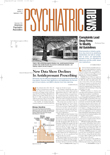Physicians underprescribe cognitive-behavioral therapies (CBT) and hypnotics and overprescribe antidepressants for chronic insomnia, according to a state-of-the-science review.
Behavioral therapy, CBT, and hypnotic medications are first-line interventions for chronic insomnia in adults, according to the review, which was commissioned by the National Institutes of Health (NIH).
“Very little evidence supports the efficacy of other treatments, despite their widespread use,” the NIH review panel concluded at its meeting in Bethesda, Md., in June. Physicians and the general public need to know what works and what does not, the panel said, because insomnia may persist for years, even decades, and compromises health, cognition, work productivity, and quality of life.
Primary care physicians, as well as psychiatrists, prescribe antidepressants more often than CBT and hypnotics for patients with persistent trouble sleeping, the panel noted. This use of antidepressants is off-label, that is, not an indication approved by the U.S. Food and Drug Administration (FDA). There's a paucity of studies showing antidepressants relieve insomnia, the panel said.
The majority of poor sleepers never seek a physician's help. Some induce sleep with alcohol, which disrupts sleep later in the night. Others take over-the-counter antihistamines, melatonin, or herbal remedies that have not undergone rigorous testing. Many try a variety of nonpharmacological techniques, such as warm baths and yoga, which aid relaxation but are not remedies for chronic insomnia.
The FDA has approved eight medications for insomnia. Benzodiazepine receptor agonists (BzRAs), introduced in the 1990s, include zaleplon (Sonata), zolpidem (Ambien), and eszopiclone (Lunesta). They largely have supplanted the older benzodiazepines, estazolam, flurazepam, quazepam, temazepam, and triazolam. With shorter half-lives than benzodiazepines, BzRAs are less likely to produce next-day sedation and trouble thinking or performing motor functions, the panel said. They also are less apt to cause dependence and rebound insomnia.
All the approved hypnotics have demonstrated efficacy. Eszopiclone, the only one studied in randomized, controlled, clinical trials, has shown sustained efficacy for six months. Introduced earlier this year, eszopiclone is the only hypnotic approved for the treatment of insomnia without a specified time limit. None of the other seven have been approved for use longer than 35 days.
Evidence from long-term studies of zaleplon and zolpidem suggest, however, that these medications may be as safe and effective as eszopiclone, said Carl Hunt, M.D., director of the National Center on Sleep Disorders Research.
Over the past two decades, the number of prescriptions for FDA-approved hypnotics for insomnia in the United States declined, while those for antidepressants to aid sleep surged. One study assessed U.S. office-based physicians' prescriptions in 2002 for drugs with a physician-specified desired action of “hypnotic,” “promote/aid sleep,” or“ sedate night.”
Physicians were 1.53 times more likely to order an antidepressant for insomnia than an FDA-approved insomnia drug, James Walsh, Ph.D., of St. Luke's Hospital and St. John's Mercy Medical Center, St. Louis, Mo., reported in the December 15, 2004, issue of Sleep. Antidepressants accounted for three of the top four drugs prescribed for insomnia. Trazodone, amitriptyline, and mirtazapine ranked 1, 3, and 4, respectively. The hypnotic zolpidem ranked second. Most antidepressant prescriptions called for dosages that would be subtherapeutic for depression, Walsh said, an indication that prescribers did not intend to target depression.
While trazodone fosters sedation and improves some sleep parameters, these benefits may not continue for more than two weeks, the panel said; there are no long-term studies of trazodone for insomnia. Studies of amitriptyline and mirtazepine in people with insomnia are lacking. Indeed, most published studies of antidepressants for sleep involve small numbers of subjects, usually people with depression. These studies typically followed subjects for one to four weeks and often lacked objective efficacy measures.
All antidepressants have potentially significant adverse effects, the panel noted.
Nonetheless, of 439 clinicians attending a psychopharmacology review course who responded to a questionnaire, 78 percent said they would add trazodone to treat insomnia associated with use of selective serotonin reuptake inhibitors, Vaughn McCall, M.D., professor and chair of psychiatry and behavioral medicine at Wake Forest University School of Medicine, told the panel. “Only a small amount of data supports this use,” McCall said.
While 78 percent of 439 respondents said they would add trazodone to treat insomnia associated with SSRI use, “only a small amount of data supports this use.”
Physicians hesitate to prescribe medications approved for only short-term use, McCall said. They may fear coming under scrutiny of medical boards if they prescribe hypnotics for longer than their approved scheduled use.
Physicians may erroneously believe that off-label medications have demonstrated sustained efficacy and are safer, he said. Physicians as well as patients also may choose antidepressants over hypnotics because of cost and formulary considerations.
McCall used a golfing analogy. “If you hit the ball well even once in a round, that's enough reinforcement to keep you going,” he said.“ If even one out of five patients reports sleeping better with trazodone, that may be enough to make a physician continue to prescribe it.”
